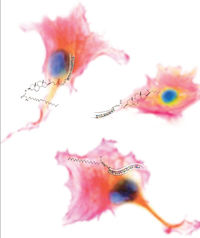BTG's Plevitrexed Shows Promising Efficacy and Tolerability in a Phase I/II study
Advertisement
BTG plc announced the successful outcome of a Phase I/II study of plevitrexed, a selective inhibitor of thymidylate synthase targeting gastric, pancreatic and ovarian cancer. The study, presented at the ASCO 2007 Gastrointestinal Cancers Symposium in Orlando, Florida was designed to investigate the efficacy, safety and tolerability of plevitrexed in patients with advanced and/or metastatic gastric cancer.
Of the 28 patients who were evaluable for response at the recommended dose level of 130 mg/m2 taken into the Phase II part of the study, five patients had a partial response (17.9% response rate) and a further 15 patients (53.6%) had stable disease giving an overall disease control rate of 71.4%. One patient on the lower dose of 65 mg/m2 had a complete response and an additional five patients who received the higher dose of 165 mg/m2 had stable disease.
The use of nutritional supplements improved the dosing consistency and allowed for greater dose intensity. Only 30.6% of patients required dose interruptions or modifications compared with 61.8% of patients in a previous plevitrexed study. The maximum tolerated dose doubled to 130 mg/m2 and was given more consistently than in the previous study and with fewer missed doses, but no increase in grade 3/4 neutropenia was observed.
The overall efficacy of plevitrexed was in line with other single agent therapy and with that seen in a previous study of plevitrexed (17% response rate), as well as with the recently reported two-drug combination treatment of cisplatin and 5-FU in the V325 comparative study (25% response rate for the cisplatin/5FU arm). The Progression Free Survival of 120 days for plevitrexed in the current study was similar to the Time To Progression of 111 days for cisplatin/5-FU in the V325 study, and median overall survival was also similar (239 days versus 258 days). The number of treatment cycles of cisplatin/5-FU was the same (4) but plevitrexed showed less toxicity, especially neutropenia (reduction in circulating white blood cells). In the V325 study the incidence of grade 3/4 neutropenia was 57% with 12% febrile neutropenia (with accompanying fever), compared with an incidence of 39% grade 3/4 neutropenia with only 3% febrile neutropenia in the current plevitrexed study.
Topics
Organizations
Other news from the department research and development

Get the life science industry in your inbox
By submitting this form you agree that LUMITOS AG will send you the newsletter(s) selected above by email. Your data will not be passed on to third parties. Your data will be stored and processed in accordance with our data protection regulations. LUMITOS may contact you by email for the purpose of advertising or market and opinion surveys. You can revoke your consent at any time without giving reasons to LUMITOS AG, Ernst-Augustin-Str. 2, 12489 Berlin, Germany or by e-mail at revoke@lumitos.com with effect for the future. In addition, each email contains a link to unsubscribe from the corresponding newsletter.


























































